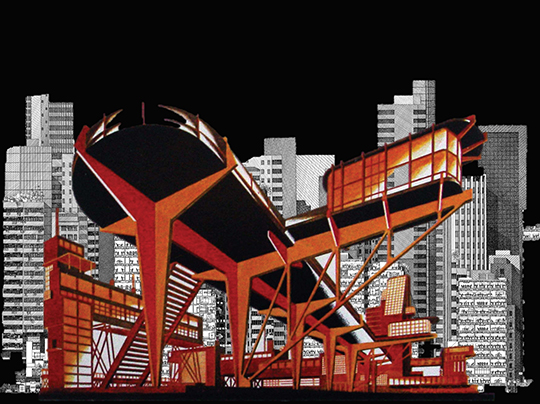Studio 05
Parametric Parasite
Justyna Karakiewicz and Liang Yang

This studio is co-taught as ABPL90389 Urban Design Studio C.
Studio Description
Cities are revitalised by productive activity. In this studio, we will explore how design can spark change. Most importantly, we will experience how “crazy” thinking leads to real change.
Design has context. The challenge you will be set is to bring industry (the parasite) back to our cities through a functional intervention. You will be able to choose any industry you like, as long as it is related to mushrooms, bamboo, or bees.
We will also look at spatial implications. Design always has scale, but in this studio, you will develop your context and work at any scale, of a bus stop, a building, or the whole city.
Studio 05 offers you a chance not only to have great time designing and therefore reconfiguring the existing conditions
and
trying to realise your dreams for better world
but
also learn how to justify your concepts by gathering data and information so your “crazy” proposal makes a lot of sense.
Cross-disciplinary collaboration is key. In this studio, we bring together students in Architecture Studios CDE together with students from MUD Studio C, learning from each other and contributing to a bigger goal.
Studio Outcomes
The title of the studio is PARAMETRIC PARASITE.
PARASITE: Parasites usually have a negative connotation, seen as a malfunction, an error, or distortion of a condition. Thus, parasites are something to be expelled or to be rid of. But parasites are integral part of any system. They create disturbances, perturbations, turbulences, encouraging a system to reconfigure and reinvigorate and they promote diversity and resilience. These intrusions open up potentials and possibilities, allowing for innovation to occur and new capabilities to emerge. Over the past 150 years, industry was seen as parasitic in cities, to be expelled and zoned away. In this studio, we will examine how industry promotes urban resilience and diversity, but we need to investigate new forms of urban industry.
PARAMETRIC: Studio 05 will introduce (or enhance) techniques in parametric modelling and agent-based modelling. You will be able to work digitally or in analogue, but in both cases, you will learn how to illustrate consequences of your action and it impact on urban and natural environment.
This semester, you will learn how to think in a system and act like an entrepreneur. But most of all, you will have a lot of fun demonstrating that “crazy” is good.
Studio Leaders
Justyna KARAKIEWICZ, BArch(Hon), trained as an architect at the Architectural Association. She taught at the Architectural Association, Bartlett School of Architecture, University College, London and spent 14 years as Associate Professor at The University of Hong Kong. Currently Professor at The University of Melbourne. She has exhibited work in Royal Academy (London), Venice Biennale (three times), New York, Kyoto, Barcelona, Hong Kong, Beijing, Sydney and some twenty other venues. Her numerous successes in international competitions include First Prizes in: Gateway to Mecca (1979); Crystal Palace Solar Housing Competition (1981; built); Dunkerque Waterfront (1992; partially built); Swansea Working Men’s Club (1995; built); awarded Prize at Royal Academy Summer Exhibition for the best drawing (2005); Honorable Mention and prize in Asia Front Village 39th Central Glass International Architectural Design Competition sponsored by Shinkenchikusha Co., Ltd., Prize (2004); Honorable Mention in Modern Saudi House Design Competition (2004); Honorable Mention in eVolo Annual Skyscraper Architectural Competition (2006); First prize for Spinney Garden project completed 20 years ago, Housing Design Awards 2008 Historic Awards (2008); Second Prize in the Austral Bricks Design Ideas Competition (2010). Justyna has published over 70 papers, 12 book chapters and three books: The Making of Hong Kong and Promoting Sustainable Living: Sustainability as an Object of Desire and Urban Galapagos published in December 2019.
Liang YANG graduated from the University of Melbourne in 2016. He is a registered architect in Australia and a computational design specialist focusing on technology and its application in practice. He working full-time in DCM, award-winning international design practice, Liang is experienced with delivering mid-to-large scale projects and capable of providing flexible and efficient automated design solutions.
Readings & References
- Bowles, C. (2018) Future Ethics.
- Monteiro, Mike. (2019) Ruin by Design.
- Papanek, V. (1971) Design for the Real World.
- Hawken, P. (1993) The Ecology of Commerce.
- Guallart, V. (2010) Self Sufficient Cities.
- Latour, Bruno. “Down to Earth: Politics in the New Climatic Regime”.
- Richard J. Weller, “Précis” in Richard J. Weller, Claire Hoch, and Chieh Huang, Atlas for the End of the World (2017).
- Whiston Spirn, A. Ecological Urbanism: Framework for Design of Resilient Cities.
- Ricci, D. Designing at the Present Tense.
- Sanford Kwinter and Cynthia Davidson, Far from Equilibrium: Essays on Technology and Design Culture.
- Karakiewicz, J. "Sustainability as an Object of Desire" chapter 1, "Sustainability, Technology, Media and Us" ask Justyna to send you PDF. Any other chapters from this book are available on request.
- Karakiewicz, J. "Purturbanism in Future Cities" AD article, PDF available from Justyna.
- Karakiewicz, J., Holguin, T. Kvan, "Hope in Purturbanism" PDF available from Justyna.
Schedule Thursdays 09:00-15:00 Online